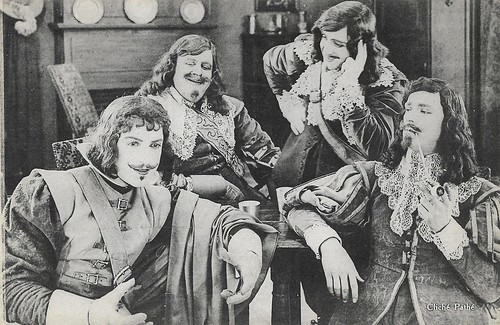
French postcard. Photo: Pathé. Left to right: Aimé Simon-Girard as D'Artagnan, Charles Martinelli as Porthos, Pierre de Guingand as Aramis, and Henri Rollan as Athos in Les trois mousquetaires/The Three Musketeers (Henri Diamant-Berger, 1921). This card is part of six cards of this film we recently found at the Utrecht collectors' fair. These are additional to the ones we already uploaded. The others will be uploaded soon.

French postcard. Photo: Rahma. Georges Colin as Le Tigre in the play 'Le Tigre et Coquelicot' by Charles Henry Hirsch, staged in 1923 at the Théâtre Cora Laparcerie in Paris. Laparcerie played the female lead opposite Colin.
Georges Colin (1880-1945) was a French actor, who appeared in nearly 40 silent and sound films between 1909 and 1945.

French postcard by Théâtre du Chatelet. Photo: scene from the play 'La Tour du Monde en 80 jours' (Around the world in eighty days). Caption: Pièce à grand spectacle de D'Ennery et monsieur Jules Verne. 13e Tableau, La Ligne du Pacifique. L'Attaque du Train. (A large-scale play by D'Ennery and Monsieur Jules Verne. 13th act, The Pacific Line. The Attack on the Train.)
The play 'La Tour du Monde en 80 jours' (Around the world in eighty days) was written by Adolphe D'Ennery and Jules Verne, after Verne's eponymous novel, written in 1873-1874. It was first performed 7 November 1874 at the Théâtre de la Porte-Saint-Martin in Paris. Despite the enormous investments, even a real elephant was involved, the play was a giant success. People were queuing around the block to see how one could travel the whole world in eighty days, and in the case of the play, within the time span of just a few hours. From 1874 to the start of WWII, the play was constantly restaged and with great success. The version of this card must date from the early 1900s, while the first staging at the Châtelet dates of 1887, where it remained a crowd-puller for years. On 19 June, EFSP will present a special post on the French author, 'Written by Jules Verne'.
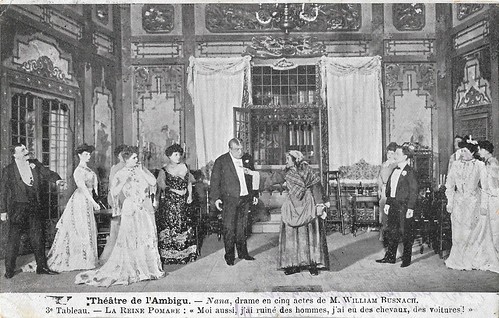
French postcard. Scene from the play 'Nanà' by William Busnach, a play in five acts adapted from the novel by Emile Zola and performed at the Théâtre de l'Ambigu. Tableau 3, Queen Pomare: I too ruined men, owned horses and carriages. The play was first performed at the Théâtre de l'Ambigu on 6 February 1904. Nanâ was played by Armande Cassive. It was one of her most memorable roles.
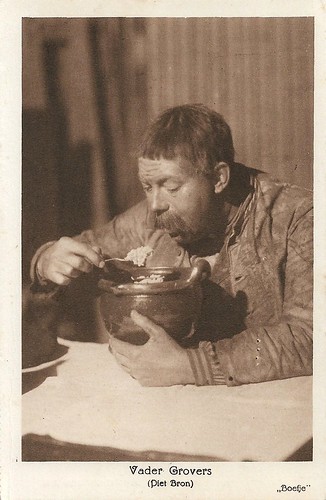
Dutch postcard by Vereenigd Rotterdamsch Hofstadtooneel, part of a booklet on the stage play 'Boefje'. Photo: Willem Coret, The Hague. Piet Bron as father Grovers in the stage play 'Boefje' (Little Rascal, 1922), starring Annie van Ees, who also played the lead in the 1939 Dutch film adaptation by Douglas Sirk. The play was staged by Van Ees' husband, Cor van der Lugt Melsert and was immensely popular.
Dutch stage and screen actor Piet Bron (1882-1973) was especially known for his father role in the play 'Boefje', adapted from the 1905 novel by M.J. Brusse. Bron played the part 550 times. Bron also acted in the film. He had one of the leads in the film adaptation of Merijntje Gijzen's jeugd (1936), based on the novel by A.M. de Jong, and directed by German emigré Kurt Gerron.
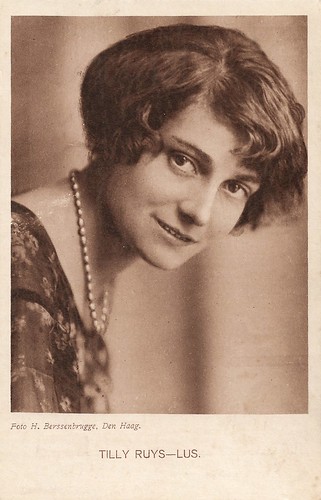
Dutch postcard in the Photogravure series b, no. 903. Photo: Henri Berssenbrugge, The Hague. This sepia card is part of a large series of 1920s Dutch stage players and directors, photographed by Berssenbrugge and other acclaimed Dutch photographers such as J. Merkelbach.
Tilly Lus (1888-1971) was a Dutch theatre actress. She also played a handful of parts in Dutch silent cinema between 1911 and 1915. She debuted as a supporting actress in the film De Bannelingen/The Exiles (Leon Boedels, Caroline van Dommelen, 1911), produced by Film-Fabriek F.A. Nöggerath. In 1912 Lus started to act also at the new film company Hollandia. In 1915, she married Cor Ruys, actor and theatre manager, with whom she had six children.
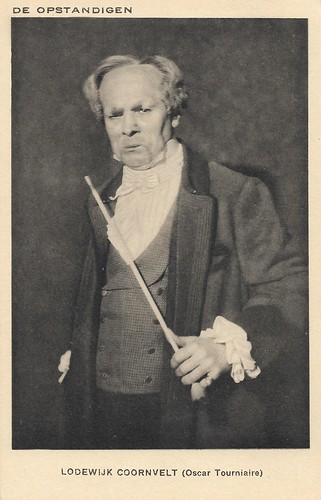
Dutch postcard. Part of a booklet of cards for the Dutch stage play 'De Opstandigen' (The Rebels) by August Defresne and based on the novel by Jo van Ammers-Küller. It premiered on 6 November 1926 at the Hollandsche Schouwburg in Amsterdam and was performed by the company Het Nieuwe Nederlandsch Tooneel. The Director and art director of the play was Louis Saalborn.
Oscar Tourniaire had the male lead as the stern patriarch Lodewijk Coornvelt, while the female lead was for Jacqueline Royaards-Sandberg as Maria Elizabeth "Miebetje" Sylvain, the only one to resist the patriarch's autocratic, conservative rule. Oscar Tourniaire (1880-1939) was a major Dutch stage actor. In 1898 he made his stage debut with the Koninklijke Vereeniging Het Nederlandsch Tooneel (K.V.H.N.T.). Tourniaire directed one silent film for Film-Fabriek Anton Nöggerath, Roze Kate/Pink Kate (1912).
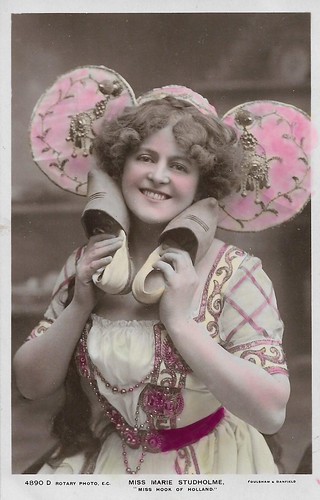
British postcard by Rotary Photo, E.C., no. 4890 D. Photo: Foulsham and Banfield. Marie Studholme in the musical comedy 'Miss Hook of Holland' (1907) by Paul Rubens. She starred in the title role, during a long provincial tour from 1907 to 1910, while originally in London, Isabel Jay played the lead in the same play.
Marie Studholme (1872-1930) was an English actress and singer of the Victorian and Edwardian eras, known for her supporting and sometimes starring roles in Edwardian musical comedy. Her attractive features (and outfits) made her one of the most popular postcard beauties of her day. The masses of postcards of her today still testify to this popularity. As far as we know, she never played in the cinema.
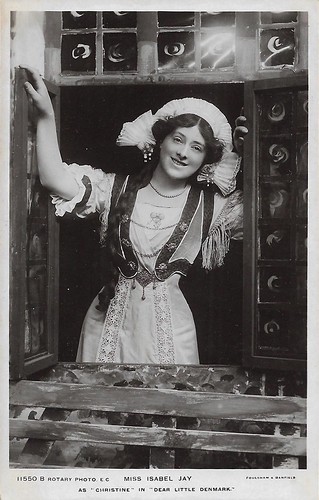
British postcard by Rotary Photo, E.C., no. 11550 B. Photo: Foulsham and Banfield. In 1909 Isabel Jay starred in the musical comedy 'Dear Little Denmark', written by Paul Rubens. It was felt to be too much of a repetition of Rubens' extremely popular operetta 'Miss Hook of Holland' (1907), in which Jay had starred before, earlier in 1907.
Isabel Jay (11879-1927) was an English opera singer and actress, best known for her performances in soprano roles of the Savoy Operas with the D'Oyly Carte Opera Company and in Edwardian musical comedies. During Jay's career, picture postcards were immensely popular, and Jay was photographed for over 400 different postcards. She retired in 1911 at age 31. As far as we know, she didn't act in the film.

British postcard by Rotary Photo, E.C., no. 11642 E. Photo: Foulsham and Banfield. Bertram Wallis in 'The Count of Luxembourg', an operetta in two acts with English lyrics and libretto by Basil Hood and Adrian Ross, music by Franz Lehár, based on Lehár's three-act German operetta 'Der Graf von Luxemburg' which had premiered in Vienna in 1909. The original production opened at Daly's Theatre in London in 1911 and ran for 345 performances, starring Lily Elsie, Huntley Wright, W. H. Berry, and Bertram Wallis.
Tall and handsome Bertram Wallis (1874-1952) was a renowned English actor and singer. He was a glamorous matinée idol in popular plays and musical comedies in the early 20th century. Between the two wars, he also appeared in several films.
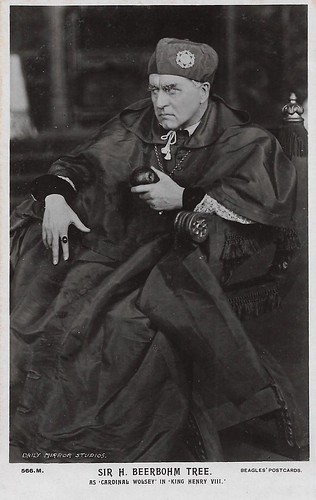
British postcard by Beagles' postcards, no. 566 M. Photo: Daily Mirror Studios. Sir Herbert Beerbohm Tree as Cardinal Wolsey in the play 'Henry VIII', Tree's longest-running revival. It ran for a sensational 254 consecutive performances from 1 September 1910 to 8 April 1911.
Sir Herbert Beerbohm Tree (1852-1917) was one of the most famous English actors and theatre managers of the late Victorian and early Edwardian periods. In 1895 he put on the first production of 'A Woman of No Importance', a new play written by Oscar Wilde. Beerbohm Tree also helped the career of George Bernard Shaw, by producing 'Pygmalion' in 1914. His lavish productions with their strong emphasis on the visual can be seen as prefiguring the cinema. The versatile and skilled actor also appeared in some early British and American films. He founded the Royal Academy of Dramatic Art in 1904 and was knighted, for his contributions to the theatre, in 1909. Famous film director Carol Reed was one of his illegitimate children and actor Oliver Reed was a grandson.
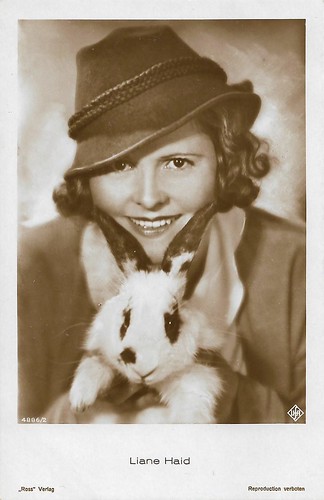
German postcard by Ross Verlag, no. 4886/2, 1929-1930. Photo: Ufa.
Prima ballerina, dancer, singer, and actress Liane Haid (1895-2000) was the first film star of Austria. She was the epitome of the 'Süßes Wiener Mädel' (Sweet Viennese Girl) and from the mid-1910s on she made close to a hundred films.

Dutch postcard by FAN Film. Photo: Carlo Aldini Film. Carlo Aldini in Der Mann ohne Kopf (Nunzio Malasomma, 1927). Dutch distributor FAN Film released the film as 'De Millionnair-Politieagent'. The back of the card makes publicity for the film at the Flora Theatre in The Hague, where the film was shown in March 1929. The film started its Dutch release in January 1929 at the Amsterdam based Passage-Bioscoop.
Carlo Aldini (1894-1961) was an athletic hero of the Italian and German silent cinema. In Der Mann ohne Kopf, Aldini plays a double role: millionaire Freddy Hillock, who has serious brain damage after a flight accident, trades places with poor police officer John, after a night of merriment and booze. For both the change has serious consequences: John has to train for many sports like wrestling and polo, under the severe guidance of a robust black trainer. Freddy becomes police officer. After causing mishap because of his confused brain, he has to save his girlfriend and after wild chases he manages, regaining his wits as bonus. The Bundesarchiv Berlin has a print of he film.

Dutch postcard, no. 178. Photo: Metro-Goldwyn-Mayer. Duncan Renaldo in Trader Horn (W.S. Van Dyke, 1931).
Renault Renaldo Duncan (1904–1980), better known as Duncan Renaldo, was a Romanian-born American actor best remembered for his portrayal of The Cisco Kid in films and on the 1950-1956 American TV series, The Cisco Kid.

West-German postcard by Kunst und Bild.
Sophia Loren (1934) rose to fame in post-war Italy as a voluptuous sex goddess. Soon after, she became one of the most successful stars of the 20th Century, who won an Oscar for her mother role in La ciociara (Vittorio De Sica, 1960).
2 comments:
So glad you were able to go again! That "Three Muskateers" card is a wonderful image. And that Loren find is stunning.
Thank you! We were happy indeed to visit the fair again. We found many beautiful cards.
Post a Comment